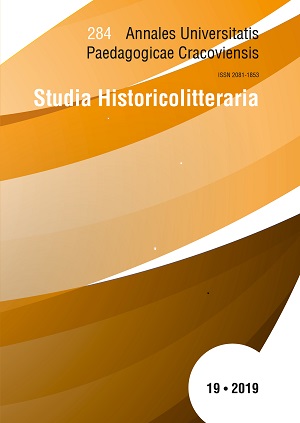Jerzy Ronard Bujański – powojenne pół sezonu w Starym Teatrze
Main Article Content
Аннотация
Jerzy Ronard Bujański was the first director of the Old Theatre after the Second World War (from the end of January to August 1945). The article presents turbulent beginnings of this management (the war was still in progress). Besides, the first premiere of the Old Theatre - Mąż doskonały by Jerzy Zawieyski - directed by Bujański, stage design by Andrzej Pronaszko. This performance referred to the character of Job from the Old Testament and was related to the Warsaw Uprising context. This show was one of the most important artistic events of the first season after the war. Next to the Old Theatre, Bujański established the Studio, which educated about one hundred people. The teachers included: Juliusz Osterwa and Tadeusz Kantor, while the students were, for example Tadeusz Łomnicki, Halina Mikołajska, Andrzej Hiolski, Kazimierz Mikulski and Jerzy Nowosielski. In August 1945, Jerzy Ronard Bujański was dismissed as a result of a conflict with the city authorities. However, during the time of his management, the theatre gained a high artistic position.
Скачивания
Article Details

Это произведение доступно по лицензии Creative Commons «Attribution-NonCommercial-NoDerivatives» («Атрибуция — Некоммерческое использование — Без производных произведений») 4.0 Всемирная.
ПОЛИТИКА АВТОРСКИХ ПРАВ
Издатель «Annales Universitatis Paedagogicae Cracoviensis. Studia Historicolitteraria» имеет право использования и распространения всех опубликованных в издании материалов на основании договора неограниченной во времени неисключительной лицензии - предварительно заключенного на неоговоренное время с каждым автором конкретного произведения на оговоренных в том договоре условиях использования.
ПОЛИТИКА ОТКРЫТОГО ДОСТУПА
«Annales Universitatis Paedagogicae Cracoviensis. Studia Historicolitteraria» это издание с открытым доступом, а все его содержание доступно бесплатно для пользователей и организаций на основаниях неисключительной лицензии CreativeCommons (CC BY-NC-ND 4.0). Пользователи могут читать, скачивать, копировать, распространять, производить поиск или переходить по ссылкам к полным текстам статей в этом издании без предварительного согласия издателя либо автора при условии указания источника доступа и авторства данной публикации. Это согласуется с определением открытого доступа BOAI (http://www.soros.org/openaccess).
Библиографические ссылки
Bujański J.R., Chwila osobliwa (Przed podniesieniem kurtyny), „Front Teatralny” 1945, nr 1, s. 2–4.
Bujański J.R., Starego Teatru druga młodość, Kraków 1985.
Fik M., Kultura polska po Jałcie. Kronika lat 1944–1981, London 1989, s. 49.
Głosy prasy, „Front Teatralny” 1945, nr 3, s. 35–36; nr 4, s. 26–27.
Kałużyński Z., Problemy powojennego teatru w Polsce, „Twórczość” 1947, nr 10, s. 27–60.
Kruczkowski L., Mesjanizm odgrzewany, „Odrodzenie” 1945, nr 20, s. 2.
Księga Hioba, przeł. z hebrajskiego C. Miłosz, Kraków 1998.
Kudliński T., Człowiek nowy – z bólu zrodzony, „Tygodnik Powszechny” 1945, nr 3.
Misiorny M., Teatry dramatyczne Ziem Zachodnich 1945–1960, Poznań 1963.
Mrozińska S., Karabin i maska, Łódź 1964.
Orzechowski E., Stary Teatr i Studio, Kraków 1974.
Pronaszko A., Zapiski scenografa. Wspomnienia, artykuły, listy, oprac. J. Timoszewicz, Warszawa 1976.
Słownik biograficzny teatru polskiego, t. 3: 1910–2000, vol. 1: A–Ł, Warszawa 2017, s. 125–127.
Wyka K., Pozycja Krakowa, „Twórczość” 1945, nr 2.
Zawieyski J., Wyznanie autora (Przed premierą „Męża doskonałego”), „Front Teatralny” 1945, nr 1, s. 5–8.
